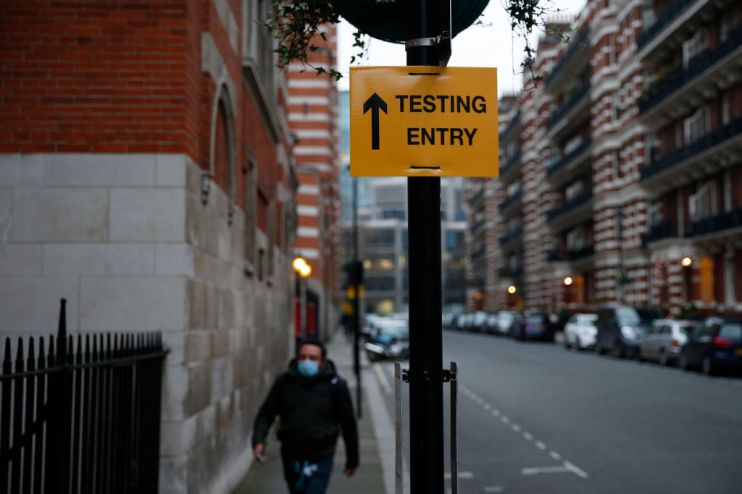Government faces calls to scrap ‘inaccurate’ rapid Covid tests

The government has faced mounting pressure to scale back its use of rapid Covid tests over concerns the results are inaccurate and may cause “serious harm”.
Rapid Covid tests, also known as lateral flow tests, are set to play a vital part in ministers’ efforts to ramp up asymptomatic testing across the country as coronavirus cases surge.
The Department for Health and Social Care (DHSC) on Sunday laid out plans to expand community testing to more than 300 local authorities using the rapid tests, which can return results in less than 30 minutes.
Health secretary Matt Hancock said the tests will be used to target asymptomatic Covid cases in care homes, across the NHS, in critical infrastructure workplaces and food manufacturers.
The DHSC said the tests would be “crucial given that around one in three people” who contract Covid-19 show no symptoms”, adding that the rapid tests had already identified more than 14,800 positive Covid-19 cases.
However, leading scientists have called on the government to scrap its wide scale rollout of the tests over “major” worries surrounding their accuracy.
Writing in the British Medical Journal today, they called on the government to “urgently change course” on the rapid Covid tests, warning that their continued use could cause “serious harm”.
Jon Deeks, biostatistician at the University of Birmingham, Angela Raffle, head of training for the UK National Screening Programme, and Mike Gill, former regional director of Public Health, pointed to recent studies questioning government claims that the tests are around 75 per cent accurate.
Data released from a pilot study of the tests in Liverpool last month showed the rapid Covid tests missed around 60 per cent of asymptomatic cases.
Meanwhile a separate study of Birmingham university students found rapid Covid tests picked up just three per cent of positive cases that would have been picked up by normal PCR tests.
“In the face of so much evidence of harm and so little evidence of benefit, why is the government pushing the rollout?,” the scientists asked, adding that it was “at least plausible that this is because hundreds of millions of Innova testing kits were purchased before it was known how they would perform”.
Test and Trace
It comes after social care minister Helen Whately faced a grilling in the Commons this afternoon over the efficacy of lateral flow tests.
Whately refused to answer questions from the shadow health and social care minister over why positive results from rapid Covid tests were not being transferred to the country’s Test and Trace programme.
Health secretary Hancock added: “The lateral flow tests for Covid-19 identify a substantial proportion for those who are shedding viral load… We identify, analyse and publish the evidential basis for the use of these tests as with the other tests that are used in the national testing programme.”
Lateral flow tests, which were first made available to the public in mid-October, were previously included in contact tracing statistics.
But the DHSC changed its reporting method last month so that only individuals with positive antigen tests, also known as PCR tests, are referred to the contact tracing programme.
“This is because those with positive [lateral flow] tests are instructed to take a confirmatory PCR test,” the DHSC said in a statement.
The DHSC in September said it would inject an extra £500m in “next generation tests, like saliva tests and rapid turnaround tests that can deliver results in just 20 minutes”, bringing total funding for lateral flow tests to more than £1bn.
The figure forms just a small part of the £22bn allocated to Test and Trace so far, which has faced strict scrutiny for repeatedly failing to meet targets.
City A.M. last week revealed that the programme failed to reach more than 30,000 people who tested positive for coronavirus in the week before Christmas, at the same time the government warned that a new coronavirus mutation was spreading across the country.
In a scathing report last month on the programme’s performance, the UK’s spending watchdog urged ministers to “stop throwing money” at Test and Trace.
“The government needs to urgently work out what’s going wrong at every step of the process. Throwing more money at the problem clearly isn’t the answer,” said Public Accounts Committee chair Meg Hillier.
The DHSC was approached for comment.